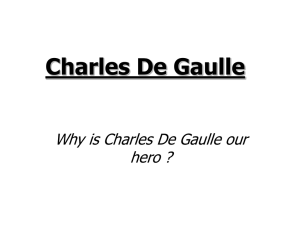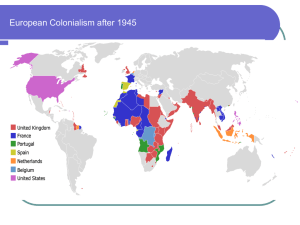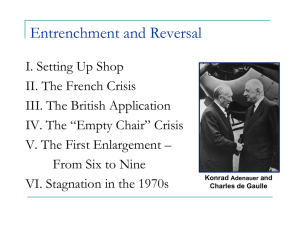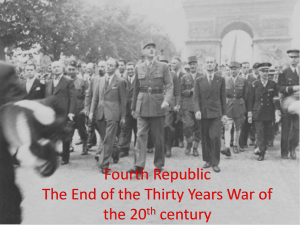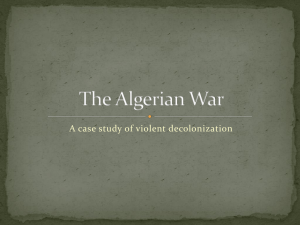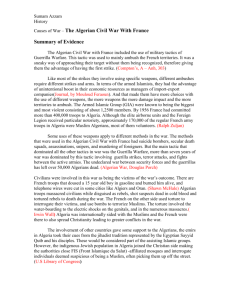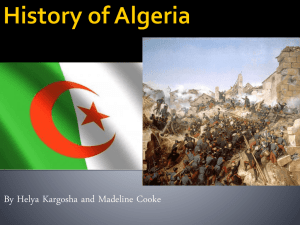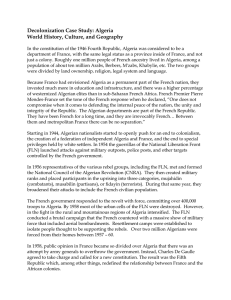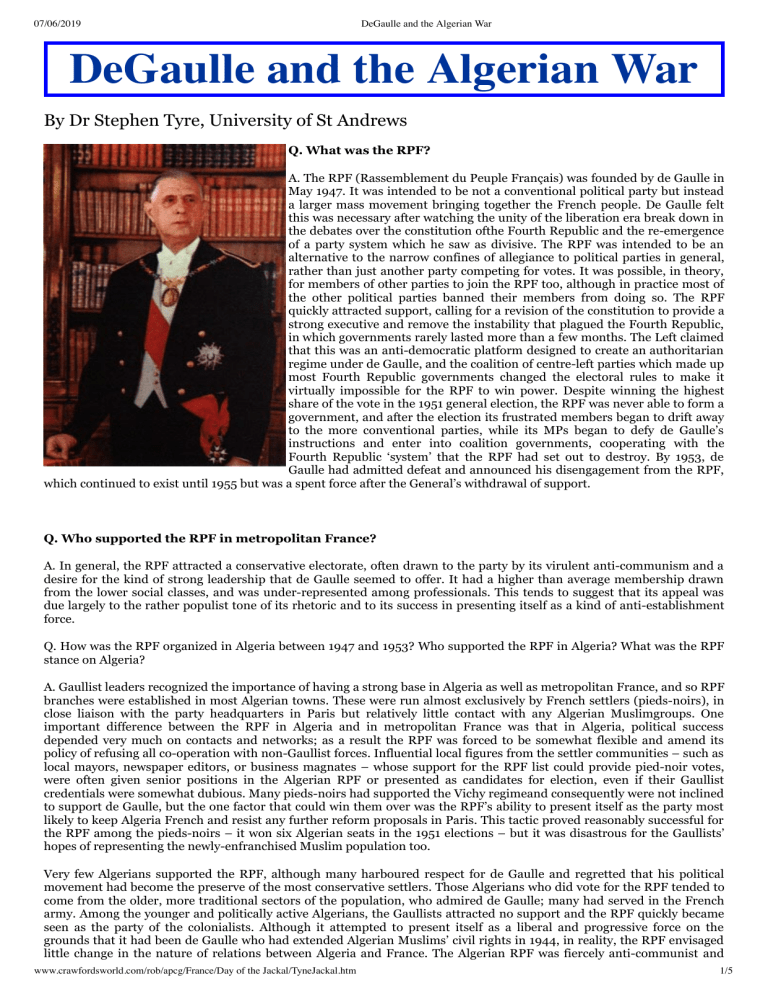
07/06/2019 DeGaulle and the Algerian War DeGaulle and the Algerian War By Dr Stephen Tyre, University of St Andrews Q. What was the RPF? A. The RPF (Rassemblement du Peuple Français) was founded by de Gaulle in May 1947. It was intended to be not a conventional political party but instead a larger mass movement bringing together the French people. De Gaulle felt this was necessary after watching the unity of the liberation era break down in the debates over the constitution ofthe Fourth Republic and the re-emergence of a party system which he saw as divisive. The RPF was intended to be an alternative to the narrow confines of allegiance to political parties in general, rather than just another party competing for votes. It was possible, in theory, for members of other parties to join the RPF too, although in practice most of the other political parties banned their members from doing so. The RPF quickly attracted support, calling for a revision of the constitution to provide a strong executive and remove the instability that plagued the Fourth Republic, in which governments rarely lasted more than a few months. The Left claimed that this was an anti-democratic platform designed to create an authoritarian regime under de Gaulle, and the coalition of centre-left parties which made up most Fourth Republic governments changed the electoral rules to make it virtually impossible for the RPF to win power. Despite winning the highest share of the vote in the 1951 general election, the RPF was never able to form a government, and after the election its frustrated members began to drift away to the more conventional parties, while its MPs began to defy de Gaulle’s instructions and enter into coalition governments, cooperating with the Fourth Republic ‘system’ that the RPF had set out to destroy. By 1953, de Gaulle had admitted defeat and announced his disengagement from the RPF, which continued to exist until 1955 but was a spent force after the General’s withdrawal of support. Q. Who supported the RPF in metropolitan France? A. In general, the RPF attracted a conservative electorate, often drawn to the party by its virulent anti-communism and a desire for the kind of strong leadership that de Gaulle seemed to offer. It had a higher than average membership drawn from the lower social classes, and was under-represented among professionals. This tends to suggest that its appeal was due largely to the rather populist tone of its rhetoric and to its success in presenting itself as a kind of anti-establishment force. Q. How was the RPF organized in Algeria between 1947 and 1953? Who supported the RPF in Algeria? What was the RPF stance on Algeria? A. Gaullist leaders recognized the importance of having a strong base in Algeria as well as metropolitan France, and so RPF branches were established in most Algerian towns. These were run almost exclusively by French settlers (pieds-noirs), in close liaison with the party headquarters in Paris but relatively little contact with any Algerian Muslimgroups. One important difference between the RPF in Algeria and in metropolitan France was that in Algeria, political success depended very much on contacts and networks; as a result the RPF was forced to be somewhat flexible and amend its policy of refusing all co-operation with non-Gaullist forces. Influential local figures from the settler communities – such as local mayors, newspaper editors, or business magnates – whose support for the RPF list could provide pied-noir votes, were often given senior positions in the Algerian RPF or presented as candidates for election, even if their Gaullist credentials were somewhat dubious. Many pieds-noirs had supported the Vichy regimeand consequently were not inclined to support de Gaulle, but the one factor that could win them over was the RPF’s ability to present itself as the party most likely to keep Algeria French and resist any further reform proposals in Paris. This tactic proved reasonably successful for the RPF among the pieds-noirs – it won six Algerian seats in the 1951 elections – but it was disastrous for the Gaullists’ hopes of representing the newly-enfranchised Muslim population too. Very few Algerians supported the RPF, although many harboured respect for de Gaulle and regretted that his political movement had become the preserve of the most conservative settlers. Those Algerians who did vote for the RPF tended to come from the older, more traditional sectors of the population, who admired de Gaulle; many had served in the French army. Among the younger and politically active Algerians, the Gaullists attracted no support and the RPF quickly became seen as the party of the colonialists. Although it attempted to present itself as a liberal and progressive force on the grounds that it had been de Gaulle who had extended Algerian Muslims’ civil rights in 1944, in reality, the RPF envisaged little change in the nature of relations between Algeria and France. The Algerian RPF was fiercely anti-communist and www.crawfordsworld.com/rob/apcg/France/Day of the Jackal/TyneJackal.htm 1/5 07/06/2019 DeGaulle and the Algerian War tended – mistakenly – to see nationalists and communists as part of the same ‘anti-French’ campaign; this prevented them from making any meaningful contact with moderate nationalists and led them to adopt a strongly pro-settler policy. Q. How did de Gaulle and other Gaullists react to the intensifying war in Algeria between November 1954 and May 1958? A. After the failure of the RPF, de Gaulle withdrew from public life and made very few public statements on the situation in Algeria between November 1954 and May 1958. Although reports about what he had said about Algeria in private conversations filtered out, the other Gaullists often lacked any real information about de Gaulle’s views on Algeria in this period. However, the Gaullists did develop policies towards the Algerian problem in the absence of de Gaulle. From the beginning of the Algerian War in November 1954, they repeatedly called for the FLN (Front de Libération Nationale) rebellion to be defeated through increased military force, ruling out any prospect of negotiation. They also placed more emphasis than most on what they termed foreign ‘interference’ in the war, in the form of support for the FLN from the Soviet bloc and the Arab states (especially Egypt), American criticism of French policy, and discussion of the problem at the United Nations. The Gaullists argued that, as Algeria was technically not a colony but an integral part of France, the problem was a domestic one over which France should exercise full control. They frequently criticized Fourth Republic governments for failing to prevent this kind of foreign ‘interference’, though in practice it is difficult to see what could have been done to this effect given the FLN’s success in alerting international opinion to the situation in Algeria. While many Gaullists acknowledged that reform was needed in Algeria, they advocated, not a loosening of ties, but rather a policy of ‘integration’, which meant complete equality of rights and status between French and Algerians – in theory, creating a large and inclusive Franco-Algerian nation. This policy won the Gaullists support among the settlers and the army officers in Algeria, because it seemed to offer a guarantee that Algeria would remain French. A second aspect of the Gaullists’ reactions to the intensifying war in Algeria in this period was that they saw the war as proof that the Fourth Republic governments were incapable of strong leadership and were therefore doing the nation a disservice. The independence of Indochina (1954) and Morocco and Tunisia (1956) led Gaullists to believe that Algeria too would be lost unless the Fourth Republic were overthrown and replaced by a stronger, more stable regime. To this end, they campaigned for a so-called ‘government of public safety’, led by de Gaulle, to resolve the Algerian crisis and write a new constitution. Q. What was the crisis of May 1958? How exactly did de Gaulle return to power? A. As the Algerian War intensified and France’s economic problems worsened, it became increasingly difficult to form coalition governments. From April 15, 1958, France was without a government for four weeks as a succession of potential coalitions failed to win enough support in parliament. In Algeria, the army and the pieds-noirs were growing increasingly frustrated with what they saw as defeatist and conciliatory governments in Paris, compounded by a general lack of political leadership caused by the frequent changes of government. This situation had been brought to a head in February when the French Air Force, acting without government approval, had bombed the Tunisian village of Sakiet-Sidi-Youssef, killing many civilians and attracting international condemnation and American and British intervention in the conflict as mediators. Furious at the government’s acceptance of this ‘interference’, settlers, officers and Gaullists were now actively calling for an end to the Fourth Republic, and a campaign to bring de Gaulle back to power was gathering strength. During the power vacuum in Paris, senior Gaullists sent envoys to Algiers, with instructions to co-ordinate the various settler and military groups calling for a new regimeto give direction to the war effort and keep Algeria French. The aim of this secretive Gaullist mission was to encourage rebellion in Algiers and channel it towards de Gaulle’s return to power. By the second week of May, it seemed that the moderate Pierre Pflimlin would be elected Prime Minister by the National Assembly, and it was widely expected that after his investiture, planned for May 13, he would open negotiations with the FLN. This provided the final catalyst for the various groups planning revolt in Algiers to act, the pretext being provided by the funerals of three soldiers killed by the FLN. A massive demonstration was planned for that date, intended to demonstrate the army and the settlers’ opposition to any negotiations. With the army and police doing nothing to stop them, the crowd took over the Governor-General’s offices in Algiers and formed a committee of public safety resolved to www.crawfordsworld.com/rob/apcg/France/Day of the Jackal/TyneJackal.htm 2/5 07/06/2019 DeGaulle and the Algerian War oppose any negotiations or reforms. Although the leaders of the revolt were by no means all Gaullists, General Jacques Massu, commander of the army in Algiers, turned the revolt in a Gaullist direction by proclaiming ‘Vive de Gaulle’ from the government building. The appeal to de Gaulle may have marked the culmination of the initial revolt, but it should be seen as only the beginning of a three-week-long crisis during which civil war seemed every bit as likely as the General’s peaceful return. Indeed, the National Assembly’s response to the government’s loss of control in Algiers was to confirmPflimlin as Prime Minister on the evening of May 13. At this stage, it seemed that the Gaullists’ hopes of a collapse of political power in Paris would come to nothing. On May 15, however, General Raoul Salan, Commander-in-Chief of all of Algeria, echoed Massu’s earlier ‘Vive de Gaulle’, thus breaking dramatically with military discipline by effectively calling for the recall of the unelected de Gaulle to replace the present government. De Gaulle’s response was to announce that he was ‘ready to assume the powers of the Republic’, a clear statement of his candidacy for the position of Head of State, should it become vacant. What this meant in practice was not immediately made clear. The Left accused de Gaulle and the Gaullists of planning a military coup, and de Gaulle initially did little to refute this allegation, refusing to condemn the military insubordination in Algiers. Yet it is significant that de Gaulle had used the word ‘Republic’, given his well-known disdain for the Fourth Republic’s ‘regime of parties’; this can be seen as an attempt to reassure his critics that he intended to come to power within a republican framework and not as the figurehead of a military coup. On May 19 he continued in similar vein, holding a press conference designed principally to reassure the Left that he did intend to respect the democratic process and face a vote in parliament on whether he should become Prime Minister. However, some important reservations must be highlighted regarding the apparently peaceful and democratic process by which de Gaulle prepared to return to power. Several aspects of the crisis are distinctly irregular. On May 17 the leading Gaullist Jacques Soustelle escaped from house arrest in Paris – the government had moved quickly to restrict the movements of those it suspected of planning a Gaullist-military coup – and flew to Algiers, where he set about rallying more support for de Gaulle. Many of those now supporting de Gaulle in Algiers were the so-called ‘ultras’ – right-wing Algérie française diehards, many of whom made no secret of their contempt for the Republic and support for a military coup. More seriously, on May 24 an expeditionary force drawn from the elite parachute regiment serving in Algeria landed in Corsica and took control of the island with no resistance from either police or elected officials. Plans were made for a similar operation in Paris, codenamed ‘Resurrection’, which hoped to force the government to resign and hand over power to de Gaulle. While there is no evidence that de Gaulle himself played any part in either the Corsica operation or ‘Resurrection’, many senior Gaullists – mostly RPF veterans – were in close contact with the officers planning the latter and were fully aware of the plan to bring de Gaulle to power by force if necessary. The events described here have proved problematic for attempts to explain de Gaulle’s return to power. Did the Gaullists – as they have subsequently claimed – simply exploit fears of military rebellion by encouraging talk of ‘Resurrection’ in order to convince parliament to accept de Gaulle’s return? Or were they actually planning to proceed with a coup to overthrow the elected government? Whichever explanation one favours, it is clear that the threat of military action galvanised the still-hesitant parties and parliament. De Gaulle announced boldly on May 26 that he had begun to form a government, and over the next two days held a series of clandestine and somewhat fraught meetings with leading politicians, seeking to reassure them that he would not install a dictatorial military regime. On May 28 the government resigned, and on the following day, President René Coty called upon parliament to accept de Gaulle as Prime Minister in order to avoid further chaos and prevent military action in France which, it was feared, might lead to widespread insurrection as the Communists sought to prevent a coup d’état. Despite many reservations among the Socialists, de Gaulle was elected Prime Minister by the National Assembly on June 1. He formed a coalition government and received full powers to govern without consulting parliament for six months. In September he presented the constitution of the new Fifth Republic, which was approved by a referendum, and he became its first president on January 8, 1959. Thus, the crisis in Algeria was skilfully manipulated by the Gaullists to allow de Gaulle to return to power, not only to pursue his Algerian policy but also to achieve the constitutional reform which had been the Gaullists’ main aim since 1947. Q. How did de Gaulle resolve the Algerian crisis? A. De Gaulle’s policy towards Algeria can best be understood if it is divided into two periods: before and after September 16, 1959. For the first year after his return to power, de Gaulle concentrated on two priorities: reducing the political power of the army in Algeria, and seeking to prevent the growth of nationalism through a programme of economic and social reforms. During this period he often sent out ambiguous signals; in the summer of 1958 he appeared to show support for the settlers in their desire to keep Algeria French but in October he offered the FLN a truce. In October 1958, de Gaulle also announced the Constantine Plan for economic development, which was to create 400,000 new jobs in Algeria, raise www.crawfordsworld.com/rob/apcg/France/Day of the Jackal/TyneJackal.htm 3/5 07/06/2019 DeGaulle and the Algerian War Algerian wages to French levels, and improve Algerians’ access to education and employment. This was intended to win the Algerians over to the benefits of continued association with France and put a stop to FLN recruitment. However, when the FLN rejected the offer of a truce, de Gaulle switched his focus to achieving military victory; during 1959 a major offensive delivered a series of heavy blows to the rebellion and achieved extensive French military control. Yet at the same time, de Gaulle was becoming convinced that the plan of keeping Algeria French through the model of complete integration would require expenditure and commitment far beyond that outlined in the Constantine Plan, while even the large-scale military operations could not deliver complete military victory and, crucially, there was no evidence of a mass rallying of the Algerians to France. On September 16, 1959, de Gaulle announced that the Algerians were to be offered three options – complete independence, integration, or self-determination in close association with France. He made his preference for the third option very clear. Although de Gaulle continued to insist that he would not negotiate with the FLN and that Algeria would remain in some way linked with France, this was a turning point in the war because it was now clear that de Gaulle was willing to loosen France’s ties with Algeria. From September 1959 onwards, he proceeded slowly, attempting to split the FLN while still hoping to find other Algerian negotiating partners, but gradually he edged towards independence. A series of military and pied-noir rebellions, culminating in an attempted putsch in April 1961, only served to convince both de Gaulle and the French people that a solution must be reached in Algeria. The first peace talks between the French government and the FLN took place in June 1960 but came to nothing; in January 1961 a referendumin France and Algeria approved the self-determination policy, and in May of the sameyear peace talks resumed. These stalled for nearly a year, mainly because de Gaulle initially insisted that the oil-rich Sahara would not be part of an independent Algeria, but by 1962 he had accepted the need to concede defeat on this issue in order to end the war, and the ceasefire accords were signed at Evian on March 19, 1962. It is important to note that, while de Gaulle may have come to accept the inevitability of Algerian independence and the futility of pursuing the war, there is little evidence that he had always intended to proceed in such a manner. Before September 1959, he had tried a number of ways of keeping the link between France and Algeria, and it was with reluctance and regret that he presided over the end of the French presence there. Ironically, one of the most important factors affecting de Gaulle’s decision-making was not the actions of the Algerian nationalists but rather the rise of counterterrorismamong sections of the settler population, supported by some of the army in Algeria. The OAS (Organisation Armée Secrète), in 1961-62, attempted to preserve French Algeria through a campaign of violence against anyone suspected of supporting Algerian independence, including attempts on de Gaulle’s life. When the OAS brought the war to metropolitan France in this way, the war’s divisive effects on the nation and its damaging impact on France’s international prestige contributed to de Gaulle’s decision to accept independence. Q. What tensions did this produce within Gaullist circles? A. It must be noted that de Gaulle’s style of government meant that once his decisions were taken, he was not easily swayed, even by his colleagues. Nonetheless, many Gaullists harboured doubts about the move towards independence. Their dilemma was one of loyalty to de Gaulle versus loyalty to Algérie française. In most cases, even those who had, before 1958, vowed never to abandon Algeria continued to support de Gaulle, in spite of their reservations. One notable exception, however, was Jacques Soustelle, a former Governor-General of Algeria and the Gaullist most clearly identified with the defence of French Algeria. Despite Soustelle’s key role in winning settler and military support for de Gaulle in May 1958, he was subsequently sidelined by de Gaulle and he resigned from his government in January 1960. Soustelle went on to become a figurehead of the Algérie française campaign, eventually going into exile until after de Gaulle’s death in 1969 in order to avoid arrest for his alleged complicity in the 1961 putsch and the OAS. Most Gaullists, however, may have considered following Soustelle into opposition over Algeria but ultimately decided that the chance to be involved in the creation of the new Fifth Republic and the modern, stable and dynamic France that they had been talking about since the 1940s was more important. De Gaulle’s Prime Minister between 1958 and 1962, Michel Debré, is the best example of this. Debré had been vocal and militant in his support for Algérie française and he barely hid his disappointment at the direction of de Gaulle’s policy, but though he offered to resign on a number of occasions, he remained in office until de Gaulle had negotiated the tricky path to independence. It has been suggested, indeed, that de Gaulle needed the support of a known conservative like Debré to allow him to pursue his Algerian policy without antagonizing mainstream conservative opinion in France. By 1962 the new Gaullist party, the UNR (Union pour la Nouvelle République) was firmly established as the dominant force in French politics, the constitutional model the Gaullists had been calling for since the 1940s was in place and most Gaullists had accepted that the loss of Algeria was an acceptable price to pay for the birth of the Fifth Republic. www.crawfordsworld.com/rob/apcg/France/Day of the Jackal/TyneJackal.htm 4/5 07/06/2019 DeGaulle and the Algerian War Further reading ‘The Gaullists, the French Army and the Algerian War before 1958: common cause or marriage of convenience?’, in Martin Alexander and John Keiger (eds) France and the Algerian War: Strategy, Operations and Diplomacy (London: Frank Cass, 2002). Anthony Hartley, Gaullism: The Rise and Fall of a Political Movement (London: Routledge & Kegan Paul, 1972). Alistair Horne, A Savage War of Peace (London: Pan, 2002). Jean Lacouture, De Gaulle: The Ruler 1945-1970 (London: Harvill, 1991). Charles Maier and Dan White (eds) The Thirteenth of May: The Advent of de Gaulle’s Republic (New York: Oxford University Press, 1968). René Remond, Le retour de de Gaulle: 1958 (Brussels: Complexe, 1983). Odile Rudelle, Mai 1958: de Gaulle et la République (Paris: Plon, 1988). The Day of the Jackal www.crawfordsworld.com/rob/apcg/France/Day of the Jackal/TyneJackal.htm AP Comparative Government France Unit 5/5
